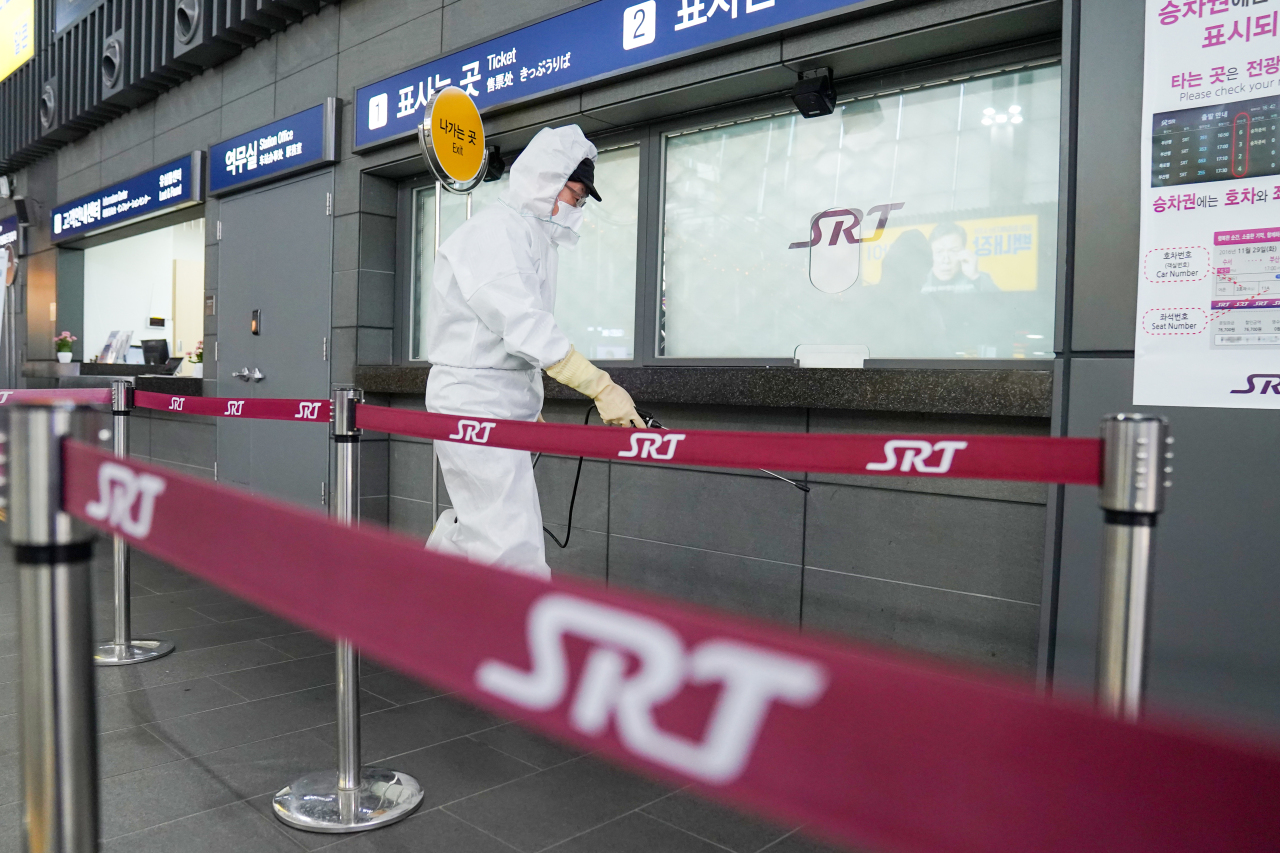 |
Wearing protective gear, a worker at Suseo Station disinfect the ticket office area for the SRT bullet train on Thursday, amid heightened concern over the spread of Wuhan coronavius ahead of the Lunar New Year holidays. (Yonhap) |
Seoul on Thursday issued a travel alert for Wuhan, the epicenter of an outbreak of a new coronavirus in China, in an effort to stop the rapid spread of the deadly respiratory disease.
Airports, ports, train stations and hospitals were put on high alert ahead of the four-day Lunar New Year holidays, a season for travel.
South Korea’s Foreign Ministry assigned Wuhan, in China’s Hubei province, a warning level of “restraint,” the third-highest in the country’s four-tier system. It issued a “caution,” one notch lower, for other areas of Hubei province.
“The alert measure has been taken in consideration of an increase in confirmed cases of the new coronavirus that originated in Wuhan in December and the Chinese authorities’ steps of suspending outward flights and public transportation in Wuhan,” the ministry said in a statement. The ministry said it would continue to monitor the situation closely and review its alert levels accordingly.
It urged Koreans residing in Wuhan to take extra safety precautions and advised Koreans to think carefully if they are considering traveling to the area. There are about 1,000 Korean residents in the city, which has strong economic ties with Seoul, specifically in electronics.
Korean Air said it will halt all its flights to Wuhan by the end of January, as most inbound and outbound flights into the city on domestic and international routes are suspended. Korea’s national flag carrier currently operates four flights a week from Incheon International Airport to Wuhan Tianhe International Airport.
The newly identified respiratory virus has killed 17 as of Thursday in Wuhan, China, and more than 500 people have been infected since it first emerged in the Chinese city in December. The Wuhan coronavirus, related to the viruses that cause the deadly SARS and MERS, has also reached the US, Japan, Taiwan, Thailand and Korea.
In Korea, the first case of the Wuhan coronavirus was confirmed Monday in a Chinese woman who arrived at Incheon International Airport from Wuhan, stoking fears of an outbreak here. She is now under quarantine at a hospital and her condition is “stable,” according to the Korea Centers for Disease Control and Prevention.
All 21 people suspected of being infected here had tested negative as of Thursday morning, according to the KCDC. All 21 had visited Wuhan, and all of them underwent tests after showing symptoms such as high fever and sore throat.
Despite the lack of any additional reported cases here, Seoul’s health authorities, airports and other related agencies are beefing up their monitoring and checking passengers from China and other countries for any symptoms of illness, keeping in mind the 2015 outbreak of MERS, or Middle East Respiratory syndrome, which affected 186 people and killed 36.
“The spread of infectious disease can be stopped with countermeasures that can be seen as excessive from early on,” Prime Minister Chung Sye-kyun said. “I’ve instructed to put tighter measures to prevent epidemics, and to closely monitor quarantine efforts at the airports and ports across the country, especially with many travelers expected to enter Korea during the Lunar New Year.”
The Wuhan virus has ignited fears across hospitals in Korea, as it recalls the situation in 2015 when the MERS virus was spread mostly inside hospitals, with over 80 percent of all confirmed cases traceable to five individuals. Hospitals here have posted written instructions for people displaying symptoms with a history of visiting Wuhan to notify medical personnel and visit selected emergency clinics. The hospitals also gave out screening guidelines to medical personnel.
The World Health Organization has yet to designate the illness a global health emergency. It held an emergency meeting on the virus Wednesday (Geneva time), and will convene another one Thursday, when it is expected to make a decision.
By Ahn Sung-mi (
sahn@heraldcorp.com)








